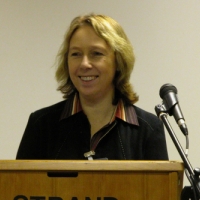 Tonight was definitely one of the highlights of Global Entrepreneurship Week for me. Our event in the British Library conference centre In conversation with Lord Sugar was full to bursting.
Tonight was definitely one of the highlights of Global Entrepreneurship Week for me. Our event in the British Library conference centre In conversation with Lord Sugar was full to bursting.
As time is short and it is now after midnight, I am going to post my notes of his gems and leave it at that.
Is now a good time to be setting up a new business?
Lord Sugar’s route into business was by learning business skills by working in a company and then applying these to his new business.
He is concerned that people wake up one day and decide to start a business, but don’t have the relevant skills or experience to make a go of it.
Opportunities currently exist in the property market if you have the money, but the banks will not be interested in lending.
His move into computers was a natural development of his business selling transistor radios, rather than a revolutionary move.
What is the best piece of business advice he has ever taken?
He used his bank as a barometer in his early days in the 1960’s to find out how fast he could and should develop. This is in contrast to more recent times when the banks give too easily and freely.
He encourages youngsters to start small with their own money and grow from there.
I have not been very successful in investing in the property market. I took all the money I earned from technology and put it into safe and boring properties. There was no rocket science in what I did.
What do you think about MBA’s in entrepreneurship
You can’t train entrepreneurs, you either have the spirit or you don’t. Business training is important but not a substitute for an entrepreneurial spirit.
Has reading business books been useful?
No, not really, I last used one for a wobbly table.
How important is a business plan?
The key point is the business idea any good. For instance if it is a service it is all about the quality of the person providing the service. No excel spreadsheet is magically going to make it work.
There is no point of any business support unless the idea is any good.
How important are work teams?
The team found Lord Sugar rather than vice versa.
Tell us about challenging periods and mistakes made.
Over 40 years in business made less mistakes than good decisions. You learn by your mistakes. He encourages young business to do a weekly health check. What has gone right this week and what has gone wrong?
How do you use sweat equity?
I’m a thick bloke from Hackney, so keep it simple. I don’t understand what you are talking about.
Advice on partnerships
When you need to add a level of expertise to your business you can either add a partner or find a suitable employee.
Can government employees give help to small business when they read them from a computer screen?
Business Links centres have the tools to take some of the burden away from business people with practical advice on employment law, tax regulations etc. They are not giving business advice, but practical help.
Common attributes for entrepreneurial spirit?
(Exasperated) I wish someone would give me an answer to this one.
Have you had a mentor?
Yes. In my business career my mentors were people I aspired to. In my family there was only my uncle. Later on my supplier of electrical equipment became my mentor. Grew beyond them on to the likes of Lord Weinstock at GEC and Rupert Murdoch. Looked, listened and tried to replicate what they were doing.
The role of PR
Differentiates the role of business PR and personal PR. Editorial on a product or service is worth more than advertising. Has a lot to do with connections with media. PR companies who don’t specialise are not as successful as the ones that don’t.
Selling and the art of closing a deal
I the person running the business is not a good sales person then why are they in business. This is another art that can’t really be taught. If you can’t do it, employ someone who is.
How do you like people to communicate in Business?
Very openly in my place, everybody shares the story and knows what is going on.
I admire people who have reached contentment with their lives and know how to enjoy themselves.
How challenging have you found this new Business Champion role?
This is not a challenge, I’m not looking for a headache. I won’t don’t it if I didn’t enjoy it. I wanted to give something back to young people
Do you invest outside of the UK?
We have in the past with electronics. I don’t have any at the moment. There are problems with investing in Africa. It is a difficult market. It needs some African entrepreneurs to create the new markets and some business traffic.
What is the main cause of the 95% of business start-up failures.
Should do a weekly health check. Immediately you know where you business is going. Do not lose track of the basics. Do the simple maths every week.
How do we encourage an enterprise culture in the UK? Rachel Elnaugh – ex Dragons Den
Programmes like Dragons Den and The Apprentice have provided a great service to this country to spread the message that there are no free gifts or free lunches. That you actually have to do it yourself. There is too much of a culture that expects to be spoon fed.
If someone could invent a positive journalist then this would encourage people. Get away from this blame culture.
I don’t like the way we have changed to a knocking culture in recent years.
What could schools do to improve things for business?
We need to make plumbing cool again.
Do you set yourself goals?
Right at the beginning it was just to earn more money than in the job I had just left. If by Wednesday I had achieve £60 of net profit then I had achieved my goal.
I never had a five year plan. In the electronics business this is bullshit. You can’t see that far ahead.
Ideas have to be endorsed by a third party, it is no good getting your friends and family to say how great it is. You need a wake call.
You make people believe in your potential by your past successes.
 For any of you who have watched entrepreneurs pitching their business on the BBC’s Dragons‘ Den (or even better the Harry Enfield spoof version below), I’m sure you will agree it is often too painful to bear.
For any of you who have watched entrepreneurs pitching their business on the BBC’s Dragons‘ Den (or even better the Harry Enfield spoof version below), I’m sure you will agree it is often too painful to bear.








 I’ve just read
I’ve just read 

 Tonight was definitely one of the highlights of Global Entrepreneurship Week for me. Our event in the British Library conference centre In conversation with Lord Sugar was full to bursting.
Tonight was definitely one of the highlights of Global Entrepreneurship Week for me. Our event in the British Library conference centre In conversation with Lord Sugar was full to bursting. Episode one: From idea to business
Episode one: From idea to business